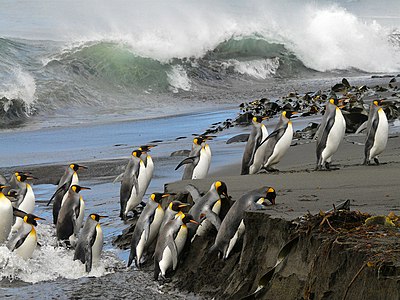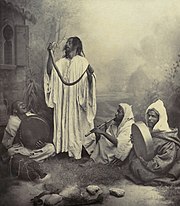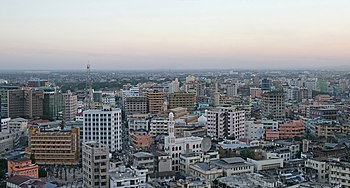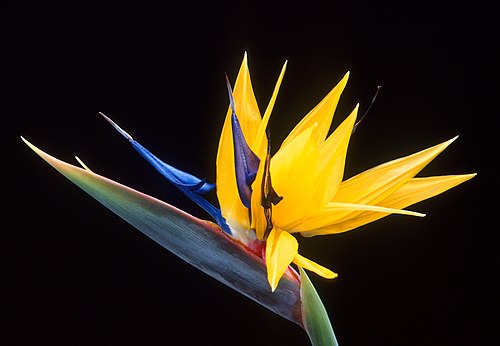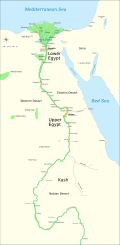Portal:Africa



Africa is the world's second-largest and second-most populous continent after Asia. At about 30.3 million km2 (11.7 million square miles) including adjacent islands, it covers 20% of Earth's land area and 6% of its total surface area. With nearly 1.4 billion people as of 2021, it accounts for about 18% of the world's human population. Africa's population is the youngest among all the continents; the median age in 2012 was 19.7, when the worldwide median age was 30.4. Based on 2024 projections, Africa's population will reach 3.8 billion people by 2099. Africa is the least wealthy inhabited continent per capita and second-least wealthy by total wealth, ahead of Oceania. Scholars have attributed this to different factors including geography, climate, corruption, colonialism, the Cold War, and neocolonialism. Despite this low concentration of wealth, recent economic expansion and a large and young population make Africa an important economic market in the broader global context. Africa has a large quantity of natural resources and food resources, including diamonds, sugar, salt, gold, iron, cobalt, uranium, copper, bauxite, silver, petroleum, natural gas, cocoa beans, and.
Africa straddles the equator and the prime meridian. It is the only continent to stretch from the northern temperate to the southern temperate zones. The majority of the continent and its countries are in the Northern Hemisphere, with a substantial portion and a number of countries in the Southern Hemisphere. Most of the continent lies in the tropics, except for a large part of Western Sahara, Algeria, Libya and Egypt, the northern tip of Mauritania, and the entire territories of Morocco and Tunisia, which in turn are located above the tropic of Cancer, in the northern temperate zone. In the other extreme of the continent, southern Namibia, southern Botswana, great parts of South Africa, the entire territories of Lesotho and Eswatini and the southern tips of Mozambique and Madagascar are located below the tropic of Capricorn, in the southern temperate zone.
Africa is highly biodiverse; it is the continent with the largest number of megafauna species, as it was least affected by the extinction of the Pleistocene megafauna. However, Africa is also heavily affected by a wide range of environmental issues, including desertification, deforestation, water scarcity, and pollution. These entrenched environmental concerns are expected to worsen as climate change impacts Africa. The UN Intergovernmental Panel on Climate Change has identified Africa as the continent most vulnerable to climate change.
The history of Africa is long, complex, and varied, and has often been under-appreciated by the global historical community. In African societies the oral word is revered, and they have generally recorded their history via oral tradition, which has led anthropologists to term them oral civilisations, contrasted with literate civilisations which pride the written word. During the colonial period, oral sources were deprecated by European historians, which gave them the impression Africa had no recorded history. African historiography became organized at the academic level in the mid-20th century, and saw a movement towards utilising oral sources in a multidisciplinary approach, culminating in the General History of Africa, edited by specialists from across the continent. (Full article...)
Selected article –

The Niger women's national football team represents Niger in international women's football. It is governed by the Nigerien Football Federation. It has played in four FIFA-recognised matches, two of which were losses to Burkina Faso women's national football team in 2007. There is an under-20 women's national team who were supposed to participate in the 2002 African Women U-19 Championship but withdrew before playing a game. Some problems impact the development of the women's game in Africa that effect Niger of which sexism, abuse, homophobia, religion and financial setbacks have been huge factors. (Full article...)
Featured pictures –
Did you know (auto-generated) -

- ... that Muhsin Hendricks of South Africa has been described as "the world's first openly gay imam"?
- ... that desert kites in the Middle East and North Africa were used as traps for wild game?
- ... that Jane C. Beck traveled to Virginia, West Africa, and England to research the family history of Daisy Turner for her 2015 book Daisy Turner's Kin: An African American Family Saga?
- ... that The Red Moon was the first Broadway show to depict alliances between African Americans and Native Americans?
- ... that Patrick Pillay negotiated Seychelles' re-entry into the Southern African Development Community with a reduced membership fee?
- ... that the pulse stops during the soliloquy of In C Mali?
Categories
Selected biography –
Jean-Joseph Rabearivelo (4 March 1901 or 1903 – 22 June 1937), born Joseph-Casimir Rabearivelo, was a Malagasy poet who is widely considered to be Africa's first modern poet and the greatest literary artist of Madagascar. Part of the first Malagasy generation raised under French colonization, Rabearivelo grew up impoverished and failed to complete secondary education. His passion for French literature and traditional Malagasy oral poetry (hainteny) prompted him to read extensively and educate himself on a variety of subjects, including the French language and its poetic and prose traditions. He published his first poems as an adolescent in local literary reviews, soon obtaining employment at a publishing house where he worked as a proofreader and editor of its literary journals. He published numerous poetry anthologies in French and Malagasy as well as literary critiques, an opera, and two novels.
Rabearivelo's early period of modernist-inspired poetry showed skill and attracted critical attention, but adhered strictly to traditional genre conventions. The surrealist poetry he composed beginning in 1931 displayed greater originality, garnering him strong praise and acclaim. Despite increasing critical attention in international poetry reviews, Rabearivelo was never afforded access to the elite social circles of colonial Madagascar. He suffered a series of personal and professional disappointments, including the death of his daughter, the French authorities' decision to exclude him from the list of exhibitors at the Universal Exposition in Paris, and growing personal debt worsened by his opium addiction and philandering. Following Rabearivelo's suicide by cyanide poisoning in 1937, he became viewed as a colonial martyr. (Full article...)
Selected country –
 |
 |
||
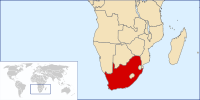
| |||
South Africa, officially the Republic of South Africa, is a country located at the southern tip of the African continent. It borders Namibia, Botswana, Zimbabwe, Mozambique, Swaziland, and Lesotho. South Africa is often called the "Rainbow Nation", a term coined by Archbishop Desmond Tutu and later adopted by then President Nelson Mandela.
South Africa is an ethnically diverse nation with the largest white, Indian, and racially-mixed communities in Africa. Black South Africans, who speak nine officially-recognized languages and many more dialects, account for slightly less than 80% of the population. Racial strife between the white minority and the black majority has played a large part in the country's history and politics, culminating in apartheid, which was instituted in 1948 by the National Party (although segregation existed prior to then). The laws that defined apartheid began to be repealed or abolished by the National Party in 1990 after a long and sometimes violent struggle. (Read more...)
Selected city –
Beira (Portuguese pronunciation: [ˈbejɾɐ]) is the capital and largest city of Sofala Province, in the central region of Mozambique.
Beira is where the Pungwe River meets the Indian Ocean. It is the fourth-largest city by population in Mozambique, after Maputo, Matola and Nampula. Beira had a population of 397,368 in 1997, which grew to 530,604 in 2019. A coastal city, it holds the regionally significant Port of Beira, which acts as a gateway for both the central interior portion of the country as well as the land-locked nations of Zimbabwe, Zambia and Malawi. (Full article...)
In the news
- 8 February 2025 – Democratic Republic of the Congo–Rwanda conflict
- A crisis summit is held involving the regional blocs SADC and the EAC, along with Rwandan President Paul Kagame. The DR Congo is represented by Prime Minister Judith Suminwa, while President Félix Tshisekedi attends virtually. The blocs call for a ceasefire and negotiations involving the M23 movement, while the Congolese do not comment. (BBC) (CNN)
- 7 February 2025 – Kivu conflict
- The United Nations and the Democratic Republic of the Congo communications minister Patrick Muyaya recognize that most of the 165 female prisoners of the Goma prison in North Kivu who were raped by escaping male inmates a week ago died in the ensuing fire. (CNN) (The Guardian)
- 7 February 2025 – Mali War
- Between 45 to 60 civilians are killed after an ambush by Islamic State gunmen against a convoy of buses in Gao, Mali. (Xinhua)
- 7 February 2025 – Somali Civil War
- The Somali National Army, supported by local Ma'awisley clan militias, kills dozens of al-Shabaab insurgents during heavy clashes which erupted after allied forces launch an offensive targeting al-Shabaab stronghold positions in the Jicibow area of Shebelle River, Hiiraan, Somalia. (Hiiraan Online)
- 7 February 2025 – South Africa–United States relations, Racism in South Africa
- U.S. President Donald Trump orders a freeze on all foreign aid to South Africa citing a South African law that allegedly allows land to be forcibly seized from white farmers. Trump also calls for the U.S. to accept Afrikaner refugees to protect them from "government-sponsored race-based discrimination". (NDTV)
- 6 February 2025 – Kivu conflict
- Malawian President Lazarus Chakwera orders Malawian troops to withdraw from peacekeeping operations in the Democratic Republic of the Congo as the crisis escalates. Three Malawian soldiers have been killed in recent fighting in North Kivu. (BBC News)
Updated: 21:05, 9 February 2025
General images -
Africa topics
More did you know –
- ...that Rukwanzi Island, an island in Lake Albert, one of the African Great Lakes, is the subject of a territorial dispute between the Democratic Republic of the Congo and Uganda?
- ...that Oumarou Sidikou, vice-governor of the Central Bank of West African States from 1988 to 1993, was a minister in the government of Nigerien Prime Minister Hama Amadou, which was ousted by a military coup in 1996?
- ...that Jason Dunford, an All-Africa Games gold medalist and runner-up for the 2006 Kenyan Sportsman of the Year award, has a younger brother who was selected "most promising sportsman" at the same awards?
- ...that Sam Mbakwe, governor of Imo State from 1979 to 1983, served in the army of the Republic of Biafra, an Igbo secessionist state in southeastern Nigeria, during the Nigerian Civil War?
Related portals
Major Religions in Africa
North Africa
West Africa
Central Africa
East Africa
Southern Africa
Associated Wikimedia
The following Wikimedia Foundation sister projects provide more on this subject:
-
Commons
Free media repository -
Wikibooks
Free textbooks and manuals -
Wikidata
Free knowledge base -
Wikinews
Free-content news -
Wikiquote
Collection of quotations -
Wikisource
Free-content library -
Wikispecies
Directory of species -
Wikiversity
Free learning tools -
Wikivoyage
Free travel guide -
Wiktionary
Dictionary and thesaurus



